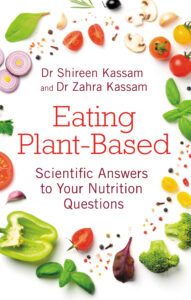
Humans for most of history have been gatherers rather than hunters, yet the myth persists that eating animals is natural and necessary. Doctors Shireen and Zahra Kassam set the record straight.
Humans are omnivores. We have a choice. We can choose to include meat, dairy and eggs in our diet, but these foods are not essential. There are no nutrients within animal-derived food that cannot be obtained from whole plant foods – the one exception being vitamin B12.
In fact, the opposite is true. Without sufficient plant foods, human health and wellbeing suffer. Plant foods are essential for vitamins and minerals such as vitamins C, E, K and folate, and of course fibre.
We evolved to be gatherers
Humans for most of history have been gatherers rather than hunters. Nutritional anthropologists have estimated that the nutrient intake of prehistoric humans included as much as 100 grams of fibre per day. That’s a lot of plant foods! Hunting animals for food is challenging for humans, and our anatomy and physiology are in fact more adapted to eating plants.
Just look at your canine teeth, for example. They are short and blunt, unlike animals that rely on meat like lions, whose canines are long, sharp and curved. Our canines would not be very effective at stabbing, tearing and killing prey.
Hunting animals for food is challenging for humans, and our anatomy and physiology are in fact more adapted to eating plants.
Most humans are lactose intolerant
The majority of the world’s population does not have the ability to digest lactose, the main sugar in dairy, beyond weaning. This is because the enzyme lactase does not persist in mammals once a mothers’ milk is unnecessary in the diet. Without the production of lactase in the gut, the consumption of dairy can lead to unpleasant symptoms such as nausea, diarrhoea and bloating. This is termed ‘lactose intolerance’.
Lactose intolerance ranges from up to 30 percent in Caucasian populations to up to 90 percent in Asian, Indian and African populations and, overall, this is the norm in 70 percent of the global population. The adaptation for digesting lactose – lactase persistence – arose around 5000-10,000 years ago, mainly in European populations in line with domestication of cows and the production of dairy. An evolutionary advantage for this adaptation does not seem to be apparent.
It is worth mentioning that no other species drinks milk beyond a young age, their own mother’s, or the milk of another species.
Overall, lactose intolerance is the norm in 70 percent of the global population.
The plant-powered way
Some of the healthiest and longest-lived populations on this planet, found in regions of the World termed Blue Zones, have in common a diet that is at least 85 percent plant-based, with some, such as vegans in Loma Linda, California, consuming no animal foods at all.
Regardless of our adaptations and ability to consume meat, dairy and eggs, the question we should be asking is ‘do we need to?’ The answer is a resounding NO.
My doctor told me I had to eat meat
What you have to understand about doctors in general, is that they will have received very little or no nutrition education during medical school. So, the nutrition advice you may receive from most doctors will not necessarily be based on the latest evidence, but will most likely reflect the preferences and biases of the doctor. Studies show that doctors who undertake regular physical activity, for example, are much more likely to promote the benefits of physical activity to their patients. In the same way, a doctor who continues to eat red and processed meat is likely to tell their patients that eating these foods in moderation is fine and that meat is necessary in the diet.
Our advice: Find a doctor, dietitian or nutritionist who is trained in nutrition and, in particular, plant-based nutrition.
Luckily, more nutrition and lifestyle training is gradually being incorporated into the medical school curricula and postgraduate education, but there will be an inevitable lag between implementing this education and the time when all doctors will be able to provide evidence-based nutrition counselling to their patients. Our advice: make sure you do your own research and acknowledge the limitations of your doctor who will be super-specialised in their own area but cannot be an expert in everything. Find a doctor, dietitian or nutritionist who is trained in nutrition and, in particular, plant-based nutrition.
 |
This article is an edited extract from Eating Plant-Based: Scientific answers to your nutrition questions by Dr Shireen Kassam and Dr Zahra Kassam. Published by Hammersmith Books. Available in Australia via Booktopia. |
Lead image: Dmussman on Shutterstock





















